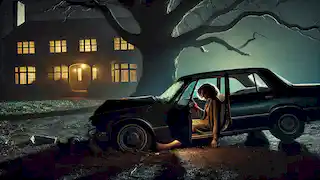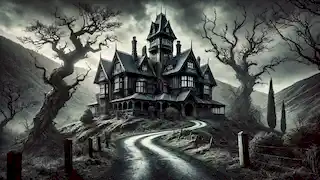Hill House, not sane, stood by itself against its hills, holding darkness within; it had stood so for eighty years and might stand for eighty more. Within, walls continued upright, bricks met neatly, floors were firm, and doors were sensibly shut; silence lay steadily against the wood and stone of Hill House, and whatever walked there, walked alone.
Dr. John Montague, an investigator of the paranormal, sought a house that would allow him to explore evidence of hauntings. Hill House had a bad reputation, an unshakable one of death, madness, and isolation. Desiring to study the phenomena of fear, Montague rented the house for three months and invited several individuals to stay with him. He selected Eleanor Vance, a young woman who had experienced a poltergeist event in her childhood; Theodora, a bohemian artist with latent psychic abilities; and Luke Sanderson, the young man who was set to inherit the house.
Hill House was more than just a structure; it was a force. It had an air of malevolence, something inherently wrong in its bones. When Eleanor arrived, she sensed it immediately. The house seemed to be watching her, and the presence of the other guests did little to allay her fears.
Eleanor’s arrival at Hill House was filled with uncertainty. She had spent her life caring for her ailing mother and had been living in the shadow of duty. The invitation to Hill House offered a way out—a chance to begin anew. But from the moment she saw the house, towering over its neglected grounds, she felt its strange allure. Eleanor, driving up the long, winding road that led to the mansion, felt as though the house was calling her name. It was as though it had been waiting for her all these years. But was it welcoming her, or was it warning her to stay away?
Dr. Montague greeted her with warmth, and soon Theodora and Luke arrived, lightening the mood with their camaraderie and charm. Theodora, with her casual, carefree attitude, seemed immune to the house’s darkness at first, while Luke treated the entire stay as a holiday from his duties. Yet, beneath the surface, the house had already begun to exert its influence on all of them, particularly on Eleanor.
The first few nights were quiet, save for the odd creaks and groans that one would expect in an old house. But as the days passed, the house revealed its nature. Doors that had been firmly closed swung open with a slow, ominous creak. Cold spots lingered in the halls, and strange sounds echoed from rooms that should have been empty. Eleanor began to feel a connection to the house, as though it were speaking to her in ways that no one else could understand.
One night, the group experienced their first significant manifestation. Awoken by loud banging on the walls, they huddled together in terror, hearing the sounds of something—something unseen—roaming the halls. The entity seemed to be targeting Eleanor specifically, as though it recognized her. It pounded on her door, shaking the very frame of her room, but when they opened the door, nothing was there. The sense of dread grew stronger with each passing day.
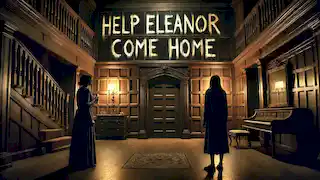
As the days wore on, Eleanor found herself wandering the halls of Hill House alone. It whispered to her in ways she couldn’t explain. She found herself drawn to certain rooms—rooms that had once belonged to the Crain family, the house's original owners. The tragic history of Hill House began to seep into her consciousness. The house had claimed many victims before her: Hugh Crain’s wives had died mysteriously, and his daughters had grown up in the house only to be driven apart by greed and resentment. The house, it seemed, thrived on tragedy and conflict.
One of the most unnerving experiences occurred when Eleanor and Theodora discovered writing on the walls. In large, crude letters, the words “HELP ELEANOR COME HOME” were scrawled across the wall. The handwriting was jagged, as though written in a frenzy. The message seemed to be for Eleanor, and Eleanor alone. The others tried to rationalize it, suggesting that perhaps Eleanor had written it herself without realizing it, but deep down, they all knew the house was responsible.
The house’s grip on Eleanor tightened with each passing day. She began to hear voices calling her name in the night, and strange visions haunted her waking moments. The line between reality and the house’s influence blurred, and Eleanor’s sense of self began to erode. She no longer knew who she was or what she wanted. The house had begun to consume her, as it had consumed others before her.
Dr. Montague, recognizing the danger, suggested that Eleanor leave Hill House. He believed that the house was using her in some way, feeding off her vulnerability. But Eleanor, by this point, was too far gone. She had come to believe that Hill House was where she belonged. For the first time in her life, she felt wanted. The house had wrapped itself around her, filling the void that had been in her heart for so long. She couldn’t leave—not now, not ever.
One of the climactic moments occurred during a final gathering in the parlor. The group was discussing the paranormal events, trying to make sense of what they had experienced. Suddenly, the room grew icy cold, and the lights flickered. Eleanor felt a presence behind her, something dark and cold that seemed to envelop her. The walls seemed to close in, and for a brief moment, she felt as though she were no longer in Hill House but in some strange, nightmarish world of her own making.
It was then that Eleanor realized the truth: the house didn’t want her to leave. It had chosen her, just as it had chosen others before her. The house had become her home, and she belonged to it now. She could no longer distinguish between her own thoughts and the influence of the house. Her mind was breaking, and she welcomed it.
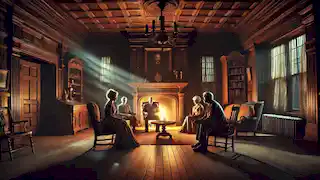
Dr. Montague, Theodora, and Luke grew increasingly concerned about Eleanor’s deteriorating mental state. They decided that she had to leave the house immediately. Dr. Montague insisted that Eleanor pack her things and go, for her own safety. But Eleanor resisted. She couldn’t imagine leaving Hill House; it had become a part of her. In a fit of desperation, she ran to her car and sped away, determined to stay at Hill House forever.
In the final, tragic scene, Eleanor, driving down the long, winding road away from Hill House, heard the voice of the house calling her back. She let go of the steering wheel, allowing the car to veer off the road and crash into a tree. The impact killed her instantly.
Hill House, standing tall and silent, had claimed another victim.
Dr. Montague, reflecting on the events, wondered whether anyone could ever truly understand the malevolent power of Hill House. It wasn’t simply a haunted house—it was something far darker. Something that could never be explained or understood. Whatever walked in Hill House, walked alone, and would continue to walk there forever.
Eleanor’s fate was sealed from the moment she arrived. The house had sensed her weakness, her longing for belonging, and had preyed upon it. In the end, Eleanor had found the home she had always wanted, but it had cost her everything.
The others left Hill House, shaken but alive, vowing never to return. Theodora and Luke resumed their lives, but they were forever changed by what they had experienced. Dr. Montague wrote his report, but the words seemed inadequate to convey the true horror of what had occurred.
Hill House remained, looming on its hill, holding its secrets and waiting for the next soul to cross its threshold.
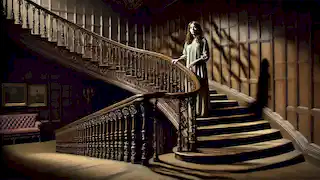
Hill House would stand for years to come, a place of mystery and malevolence. Its walls would hold the memories of those it had claimed, and its doors would remain shut to outsiders. But those who dared to enter would find themselves caught in its web, just as Eleanor had been. And the house would continue to feed on fear, loneliness, and despair.
Hill House was more than just bricks and mortar; it was a living thing, a dark entity that thrived on suffering. It was a place where reality twisted, and nothing was ever as it seemed. In the end, it wasn’t just Eleanor who was haunted—it was everyone who had ever come into contact with the house.
The house remained, standing alone and silent, its dark presence a reminder of the terrible things that had happened within its walls. And though the living may have left, Hill House remained, watching, waiting, and walking, forever alone.
